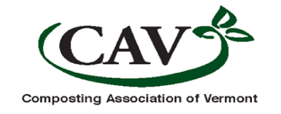Natasha Duarte is the Chair (2017 - present) of the Food Cycle Coalition, a Community of Practice within the Farm to Plate network. The Food Cycle Coalition (FCC) includes organizations, businesses and regulators with expertise in food rescue, agriculture, solid waste management, composting, and energy production. It was formed to help Vermonters transition from “waste disposal” to “resource management” for discarded food, leaf and yard material, and other organic residuals.
The vision of the Coalition is to divert food and organic materials that would otherwise be wasted and convert them into a valuable resource to support our local food system. The FCC does this through source reduction, food rescue, composting, animal feed utilization and energy production. Diverting quality food and other organic materials from the landfill will help increase food security, create jobs, reduce fossil fuel dependence, reduce greenhouse gases, protect waterways and soil, sustain local food systems, and build stronger communities.
2022 Resource for Farms
Farm to Plate’s Food Cycle Community of Practice has developed a new resource for farmers looking to expand on-farm composting in collaboration with their local community. The guide, Partnering Farms with Communities - a regulatory and start-up guide for on-farm food scrap composting, aims to clarify the regulatory landscape for both organic and conventional farms. It lays out potential options for community-oriented solutions to close regional gaps in the food scrap composting infrastructure currently available in Vermont. The guide also outlines strategies that small farms can utilize to create connections with residents, schools, food shelves, grocery stores, restaurants, and other organizations that manage food scraps and nutrients locally.
On December 15th, 2021, FCC and CAV organized a webinar on "Microplastics, Depack, and Composting in Vermont" with UVM's Dr. Eric Roy and graduate students, Kate Porterfield and Sarah Hobson.
Introduction (Natasha Duarte): 0-1:38
Eric Roy: 1:38-5:47
Katie Porterfield: 5:47-17:10
Sarah Hobson: 17:10-26:58
Katie Porterfield: 26:58-32:39
Eric Roy: 32:39-36:47
Discussion & Q&A: 36:47-1:22:17
To start the discussion, Eric and his team posed the following questions:
What has been your experience with plastic contamination in food waste feedstocks?
Any research questions you have, or are there any gaps in our research questions?
Potential scenarios for processing challenging food waste streams where contamination is likely?
If you make compost, can we partner with you?
If you’d like to continue this conversation with Eric and his team, contact Eric at eroy4@uvm.edu
Here are some additional resources that were discussed during the webinar:
From Josh Kelly, DEC/ANR: the WARM modeling that was shared with the Legislature in 2020 that compares landfilling food waste from the NEK vs. trucking it to Maine for AD.
From CAV: ICAW 2020 recorded webinar: Food Waste and the Circular Economy – Experience from Denmark
The Coalition’s first project mapped the resources and capacity within the food system to help reach Universal Recycling goals.
Download the final 28-page report “Organization Asset Mapping to Advance Organics Diversion and Food Rescue within the Food System”.
The Importance of Organics Diversion
Currently Vermonters throw away an estimated 98,739 tons (or 197,478,000 lbs) of edible food, foodscraps and processing residuals, and leaf and yard debris annually. When those materials decompose in a landfill they generate methane, a harmful greenhouse gas that has over 20 times the heat trapping traits of carbon dioxide. The Food Cycle Coalition wants to see these materials managed in a more socially and environmentally beneficial way that is good for Vermont businesses, communities, and improves food security. For example, according to a recent report released by the Institute for Local Self-Reliance that evaluates the economics of composting and the use of compost in Maryland.
The Food Cycle Coalition is committed to building healthy and resilient communities where no one is hungry and no resource is wasted.
Learn more about the activities of the Food Cycle Coalition, visit the FCC Task Force page in the F2P Atlas: http://www.vtfoodatlas.com/network/food-cycle-coalition




